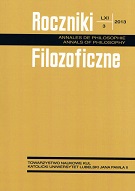Gramatyka uniwersalna - Ray Jackendoff versus Noam Chomsky
Universal Grammar: Ray Jackendoff versus Noam Chomsky
Author(s): Andrzej K. RogalskiSubject(s): Philosophy
Published by: Towarzystwo Naukowe KUL & Katolicki Uniwersytet Lubelski Jana Pawła II
Keywords: Noam Chomsky; universal grammar; Ray Jackendoff; philosophy of language; gramatyka uniwersalna; filozofia języka
Summary/Abstract: The most controversial aspect of generative grammar of Chomsky was a hypothesis that humans have a specific cognitive innate structure in language acquisition, called afterwards the Universal Grammar (UG) hypothesis. That approach was consequently sustained by him in “Syntactic Structures”, “Aspects of The Theory of Syntax”, and “The Minimalist Program”. In fact, Chomsky’s analytic attention was mostly focused on the structure of the syntax of language, that in turn is to generale different phonological structures as well as semantic ‘interpretation’ respectively. Identifying of UG with a deep-structure level of a language did not influenced in solving a problem of innate cognitive structure of humans. Ray Jackendoff, grown up among the generativists, does not share the ‘syntactocentric’ approach of Chomsky proposing the ‘parallel architecture’ in which phonological, syntactic and semantic levels are reciprocally interfaced in the program of ‘biolinguistics’ that is to encourage the necessary culture of inter-scientific collaboration. By means of his theory of conceptual semantics Jackendoff tries to show that a system of concepts expressed in human language is an autonomous generative component of human brain/mind that processed out of evolution.
Journal: Roczniki Filozoficzne
- Issue Year: 61/2013
- Issue No: 3
- Page Range: 5-28
- Page Count: 24
- Language: Polish

